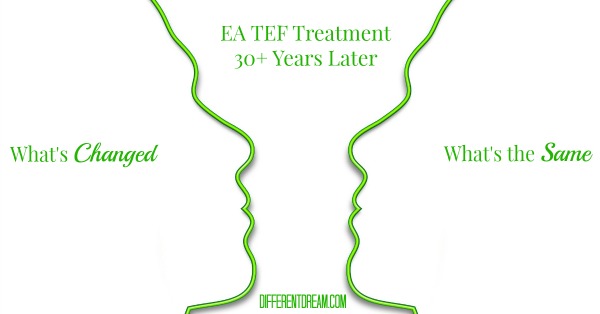5 Ways EA TEF Treatment Has Changed & 5 Ways It’s the Same

My son was diagnosed with EA TEF a few hours after his birth. I’d never heard of the condition before May 23, 1982. In the years since then, I’ve thought about it every single day. In the past 3 decades, I’ve watched advancements that have made EA TEF treatment more humane and more successful. Here are some of the most exciting:
#5 Change: EA TEF Online
The internet made it possible for the EA TEF community to connect online in groups like Facebook’s Bridging the Gap and www.eatef.org. Parents can also learn about surgeons and treatment methods at children’s hospitals around the country and the world.
#4 Change: Anesthesia
Until 1986, newborns undergoing EA TEF repair surgery received no pain medication. Thankfully, that protocol changed a few years after our son’s surgery. You can read the whole story at Can You Imagine Infant Surgery Without Anesthesia.
#3 Change: Feeding Clinics
Feeding clinics are a godsend for kids whose EA TEF treatment results in oral aversion and feeding issues. They are a godsend for parents and caretakers, also, as parents who can’t get their EA TEF child to open their mouths for any reason.
#2 Change: The Foker Process
The Foker Processs is a breakthrough treatment that makes a huge difference for long gap babies. It actually closes the gap by growing the esophagus. Amazing, amazing stuff…and it makes sense!
#1 Change: G-Tubes
Our son’s feeding tube was a Foley balloon catheter. It was huge, cumbersome, ugly, and did the job. Modern G-tubes are small, tidy things with a tiny tummy button and cool syringes for administering feedings. If your child has a modern day G-tube, be very grateful.
While many aspects of EA TEF treatment have changed, many remains the same. Such as:
#5 Unchanged Thing: Complications
Kids with EA TEF are still prone to respiratory infections because of tracheomalacia. They also can develop esophageal strictures at point of repair and many have GERD.
#4 Unchanged Thing: Barky Cough
Parents of kids with EA TEF all over the world nod their heads when they read this one. We also recognize the barky cough (it truly does sound like a seal barking) that causes other parents to hustle their kids out of range of the germs they believe are the cause of the nasty cough.
#3 Unchanged Thing: Gifted Pediatric Surgeons
Gifted, highly trained surgeons save our children’s lives. Parents of kids with EA TEF are grateful to them every day we spend with our kids.
#2 Unchanged Thing: Worried Parents
Though the doctors and nurses continually remind parents that EA TEF repairs have a high success rate, parents like us can’t help but worry. Especially when complications arise. And they do.
#1 Unchanged Thing: Different Dreams
When parents hear their children have EA TEF, their dreams for their kids change. They dream of visiting their newborns in NICU instead of in the freshly decorated nursery at home. They dream of the day their babies will eat by mouth instead of a G-tube. They dream of more effective medications to neutralize GERD.
The unchanging truth is that our parenting dreams change, but our fierce love for them does not.
How Have You Seen EA Treatment Change and Stay the Same?
Leave a comment about the ways you’ve seen EA Treatment change while staying the same. I’d love to hear what you have to say.
By Jolene
Jolene Philo is the author of the Different Dream series for parents of kids with special needs. She speaks at parenting and special needs conferences around the country. She’s also the creator and host of the Different Dream website. Sharing Love Abundantly With Special Needs Families: The 5 Love Languages® for Parents Raising Children with Disabilities, which she co-authored with Dr. Gary Chapman, was released in August of 2019 and is available at local bookstores, their bookstore website, and at Amazon.
2 Comments
Submit a Comment
Subscribe for Updates from Jolene
Related Posts
Did I Trust God’s Plan for the Life of My Child with Disabilities?
Jolene looks back on the lessons she’s learned and ponders, “Did I trust God’s plan for the life of my child with disabilities?”
Two Coping Skills for Families with Disabilities
Guest blogger Kristin Faith Evans explains two coping skills for families with disabilities that have helped her over the years.
Special Needs Homeschooling: The Ups and Downs
Special needs homeschooling is full of ups…and downs. Guest blogger Lisa Pelissier knows this from experience. In this post she describes her adventures in homeschooling, which began long before she discovered she had joined the special needs homeschooling tribe. I...






Kristen, 39 years ago it was hard to talk people down who assumed our son was exposing other kids to the flu or whatever bug was going around. I can’t imagine how the pandemic has ratcheted that up even more!
Yes, the barky cough is still a thing for us and he’s now 4. And in todays situation, it’s even harder to explain that “it’s not Covid I promise, he’s always had that cough”